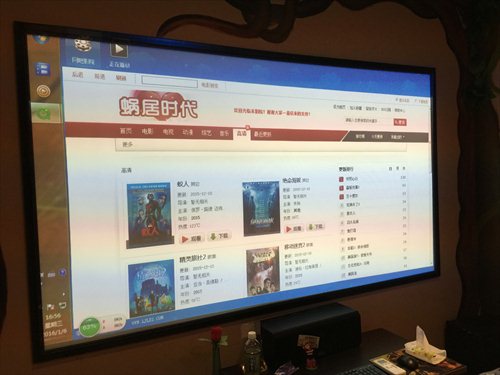HOME >> METRO SHANGHAI
The small screen scene
By Yang Lan Source:Global Times Published: 2016-1-12 18:13:01
The complicated and sometimes dodgy business of the city’s mini cinemas

A couple enjoys a movie at a private screening room. Photo: IC
In the 1980s Chinese filmgoers would frequent video rooms, much as today people hang out in karaoke bars. In those days friends and families would head to a video room where they could enjoy the latest movies which were screened from video players.
At the peak there were more than 1.5 million of these video rooms in the country. The video rooms were closed eventually - copyright laws, the growth of modern cinemas and home entertainment systems meant that they were no longer a viable public entertainment mode.
Cinemas, however, grew exponentially. While in 2002 the box office in China was worth less than 1 billion yuan ($152 million) in 2015 it was valued at 44 billion yuan, which was a 48.7 percent annual growth on the previous year. It is now the second largest movie market in the world.
But alongside the rapidly expanding cinemas and multiplexes are private venues that offer movies for people who want to view their films in a more intimate or customized manner. A search on dianping.com, one of China's leading platforms for urban and lifestyle services, showed that there are more than 150 private screening rooms operating in Shanghai.
These screening rooms offer smaller spaces and, obviously, smaller screens. But here clients can eat food, drink, party or even sleep over during a film - as long as they pay.

The sign at this private cinema says that it is connected with the Public Security Bureau and gambling, drugs and pornography are prohibited. Photo: Yang Lan/GT
Problematic approaches
It costs between 50 and 300 yuan to watch a movie in one of these rooms. But renting a room for a whole night only costs about 300 yuan. The Global Times visited three screening rooms in Shanghai and found diverse and sometimes obviously problematic approaches to the services provided.
Woju Shidai is a screening room located in a shopping mall on Zhejiang Road Middle. There were no business licenses or fire safety certificates on display and while the attendants refused to speak on the record they allowed the Global Times reporter to check out the services provided.
There are about a dozen private rooms in Woju Shidai. The screen in one of the rooms inspected was just a little larger than a standard 51-inch television but the room came with a sofa which could be used as a bed. The attendants will fetch drinks for the customers and allow food to be delivered. But on the back of the door hung a basket packed with extras customers could purchase if they wished - sexy lingerie, condoms, lubricants and vibrators.
The Room 5 screening room in an office building on Zhejiang Road South is similar. With no business licenses or fire safety certificates on display, this venue offered five screening rooms where films were projected from computers.
Here customers can eat, drink or spend the night. Unlike hotels, however, customers don't have to show their ID cards or passports or prove their age. Behind the closed doors anything goes.
Zhao Zhengbin is a lawyer and senior partner of Beijing Haowei Law Firm and said these screening rooms were quite a new phenomenon. "The Chinese laws and regulations for entertainment venues were all drafted before 2010. So there are no clear definitions for private screening rooms," Zhao said. "There are no business licenses specifically for screening rooms. Even if they applied for business licenses, they could only apply for licenses which are not really relevant for screening rooms."
Dong Ran is also a lawyer and is a partner with Jincheng Tongda & Neal in Shanghai. He said his firm had had many inquiries from screening rooms about how they could apply for business licenses.
He said that while it was illegal to run a private screening room without a business license many of the rooms had licenses but these were related to different types of business and did not officially permit them to screen films.
"If we regard screening rooms as cinemas, they would have to apply for film screening licenses and these mean applicants would have to have business licenses, fire safety certificates and professional film screening facilities. But none of these private screening rooms can fill these requirements," Dong said.

Some of the movies available at one of the screening rooms. Photo: Yang Lan/GT
Latest releases
In Woju Shidai, customers can select their movies from the room's database, which explains that the films are downloaded from the Internet and that the screening room does not have rights for the films. The catalogue includes some of the latest Hollywood releases including The Martian and 007: Spectre.
All the 894 movies available at Room 5 were also downloaded from the Internet. Among the films on offer was Fifty Shades of Grey, which has an NC-17 rating in the US and has been banned in China by the Chinese State Administration of Press, Publication, Radio, Film and Television. Some of the other movies available featured sexually explicit and violent scenes.
Both the lawyers confirmed that downloading films and screening them for profit without authorization infringes copyright. And the Chinese Regulations on Management of Entertainment Venues and the Public Security Administration Punishments Law clearly state it is illegal to screen films with erotic or violent content.
Although it appears that many of the private screening rooms in Shanghai are breaking the law, there is an alternative. The website http://www.1905.com/ works under CCTV-6, the movie channel of Chinese Central Television Station. Last June, 1905.com launched its digital entertainment platform. The platform now has the rights to more than 7,000 films and allows private screening rooms to offer these films.
"Since the launch, we have been providing legal films to private screening rooms in China. We own the exclusive rights to more than 90 percent of our films," said Wang Ying from 1905.com. "As long as they use our service, private screening rooms are covered by our video distribution license and are legally allowed to operate."
But it costs 8,500 yuan annually for the service and screening rooms have to install special software to use the platform. 1905.com's digital entertainment platform is not the only one offering legally acquired films to screening rooms.

Some of the hit movies that customers can watch are listed on this blackboard outside a private screening room. Photo: Yang Lan/GT
Cinema combinations
Unlike the two private screening rooms, Ivi Movie's Jing'an Store combines cinemas with private screening rooms.
Ivi Movie has more than 30 branches in China including two in Shanghai and one in Beijing. Mr. Chen, the director of the Ivi Movie Jing'an store told the Global Times that this outlet had 38 rooms where customers could watch movies privately. On average the rooms are rented two or three times a day.
According to Ms Shen, who is the store's marketing and communications chief, while the smallest rooms are suitable for only two or four people, the VIP rooms can accommodate four to eight people, and larger VIP rooms hold up to 30 people. "This business model which combines movie theaters and private screening rooms was introduced from Taiwan. People come here to watch movies, enjoy private parties and other activities," Shen said.
Because Ivi is licensed as a cinema it has a film screening license. But customers are not allowed to watch newly released films in the small screening rooms.
"The movies for the screening rooms are from our movie library. We are not allowed to show newly released movies in the private screening rooms," Shen said.
Lawyer Dong Ran said that only cinemas that were part of major chains could screen newly released movies in theaters in China. Other venues did not have the right to screen movies.
Wang Ying from 1905.com said there were no new releases in 1905.com's movie library. When new movies have completed their cinematic season, the platform buys the rights and puts them in the movie library.
"There are many reasons why we don't play newly released movies in our screening rooms. Every time we screen a new movie, we have to pay a large percentage of our take - almost 50 percent of our box office income for each screen. If we play one new release in a screening room, we have to charge a really high rental," Chen said. "And the small screening rooms do not have the proper facilities to play new releases."
The Chinese movie market has an explosive growth in the past few years. Last year, there were 618 Chinese-made movies released but only 308 of them made it into cinemas. Private screening rooms and online platforms could be one way for these films to find audiences.
"At present many businessmen only care about short-term benefits and run their companies illegally, for example, using residential buildings for their operations, not having fire safety certificates, ignoring copyright infringement and not having proper permits. But I think there will be new regulations introduced shortly that will allow private screening rooms to become a useful addition to the market," said Wang Ying from 1905.com.
Posted in: Metro Shanghai, City Panorama